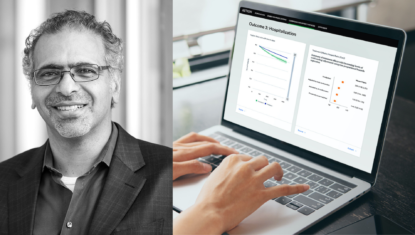Using data that is collected from patient visits is a fairly new area of research, but one that is growing very quickly. Being able to access data that is already available on hand can be very valuable to our research teams.
Related News
Research Projects
-
HEADS-ED Under 6: A clinician-administered mental health and developmental screening and triage tool
03/04/2025
It is estimated that 10% to 25% of children under the age of 6 years have mental health (MH) concerns (1–5). In young children, MH risk factors may include eating and sleeping problems, late or abnormal development, attachment issues, adverse childhood experiences, behavioural or emotional dysregulation, language delays, and unstable or unsafe home environments (5–7). However, the challenge of measuring prevalence of MH concerns during infancy and early childhood is partially due to low identification rates by health professionals (4,8,9). When clinicians assess infant MH, they can provide resources to parents and/or refer families to specialists if red flags are identified (7). Health professionals who rely solely on clinical judgement detect less than 30% to 50% of MH problems (8); thus, one way to increase early identification and assist with clinical decision-making may be for primary care providers and pediatricians to use MH screening tools (7,10,11).
-
Physician Follow-Up of Pediatric and Young Adult Emergency Department Visits for Substance Use in Ontario, Canada
01/11/2024
-
The HEADS-ED under 6: Piloting a new communimetric mental health and developmental screening and triage tool for young children
10/08/2024
Caregivers are critical to recognizing early mental health (MH) and developmental concerns in their infants and young children and communicating these concerns to their primary care physician. Early risk factors for infant MH concerns can include sleep problems, eating difficulties, abnormal development, attachment issues, emotional or behavioral outbursts, and language concerns (Skovgaard et al., 2006). Pediatricians and primary care providers also play an important role in the early identification of these risk factors and in making referrals to services that can meet their needs (Parkhurst & Friedland, 2020). The Canadian Pediatric Society's MH Task Force (Canadian Pediatric Society, 2023) set out to identify available MH screening tools. Among the tools for infants, one clinician interview and seven parent-report MH screening tools were available and take under 20 min to complete. Upon review of these and other MH screening tools for children under the age of 6 that identify important concerns (Ammitzbøll et al., 2016; Szaniecki & Barnes, 2016), none are created with the intent of communicating needs and action that should be taken for service recommendation and provision.
-
Association between prenatal air pollutant exposure and autism spectrum disorders in young children: A matched case-control study in Canada
03/08/2024
-
Associations of neighborhood greenspace, and active living environments with autism spectrum disorders: A matched case-control study in Ontario, Canada
01/07/2024
-
Trends in Rates of Opioid Agonist Treatment and Opioid-Related Deaths for Youths in Ontario, Canada, 2013-2021
06/07/2023
The overdose crisis across North America continues to worsen. While opioid-related deaths concentrate among middle-aged adults, recent data suggests an acceleration in opioid-related mortality among youths.1,2 Opioid agonist treatment (OAT) is a core response to this crisis as it is an evidence-based treatment shown to reduce opioid-related and all-cause mortality among individuals with opioid use disorder (OUD). Despite recommendation for its use,3 there are barriers to accessing OAT among youths, including: stigma, burden of witnessed dosing, and lack of availability of youth-oriented services and prescribers comfortable treating this population.4-6 Given the rising burden of opioid-related mortality in younger demographics, and the known barriers to accessing OAT in this population, we sought to contrast rates of OAT and opioid-related mortality between youths aged 15 and 24 years and adults aged 25 to 44 years in Ontario, Canada.
-
The impact of new government childcare accreditation standards on children’s in-care physical activity and sedentary time
29/03/2022
Tis study focused on a naturally occurring provincial policy change related to physical activity and ST in childcare centres. Findings suggest the new accreditation standard criterion in Alberta, Canada, regardless of the childcare environment, may not be enough on its own to change these behaviours in toddlers or preschoolers. Also, the new accreditation standard combined with coaching support appeared to have little to no impact on educators’ perceptions related to physical activity and sedentary behaviour.
-
Problem technology use, academic performance, and school connectedness among adolescents
18/02/2022
Excessive use and problem technology use are highly prevalent among secondary school students, and they are associated with lower academic performance and lower levels of school connectedness.
-
Advancing data science in drug development through an innovative computational framework for data sharing and statistical analysis
14/11/2021
Establishing this framework has been integral to the development of analytical tools.
-
Near real-time determination of B. 1.1. 7 in proportion to total SARS-CoV-2 viral load in wastewater using an allele-specific primer extension PCR strategy
15/10/2021
Our study demonstrates that this strategy can provide public health units with an additional and much needed tool to rapidly triangulate VOC incidence/prevalence with high sensitivity and lineage specificity.
-
The role of wastewater testing for SARS-CoV-2 surveillance
26/08/2021
These characteristics of SARS-CoV-2 infection, along with the observation that SARSCoV-2 is excreted in stools during all phases of infection, has led to the uptake of wastewater testing to complement SARS-CoV-2 surveillance based on clinical tests and case identification.
-
Can synthetic data be a proxy for real clinical trial data? A validation study
16/04/2021
The high concordance between the analytical results and conclusions from synthetic and real data suggests that synthetic data can be used as a reasonable proxy for real clinical trial datasets.
-
Identification and inclusion of gender factors in retrospective cohort studies: the GOING-FWD framework
09/04/2021
The application of the GOING-FWD multistep approach can help guide investigators to analyse gender and its impact on outcomes in previously collected data.
-
Evaluating the utility of synthetic COVID-19 case data
01/03/2021
A privacy risk assessment on the synthetic data showed that the attribute and membership disclosure risks were low.
-
Regional differences in access to the outdoors and outdoor play of Canadian children and youth during the COVID-19 outbreak
18/12/2020
It is unsurprising that in the provinces that have had the highest number of COVID-19 cases, there have been the most stringent restrictions on access to the outdoors. It is also unsurprising that these same provinces have had the greatest decline in time spent outdoors and in outdoor play among children and youth.
-
Evaluating Identity Disclosure Risk in Fully Synthetic Health Data: Model Development and Validation
11/11/2020
We have presented a comprehensive identity disclosure risk model for fully synthetic data. The results for this synthesis method on 2 datasets demonstrate that synthesis can reduce meaningful identity disclosure risks considerably. The risk model can be applied in the future to evaluate the privacy of fully synthetic data.
-
Canadian Association of Radiologists White Paper on De-Identification of Medical Imaging: Part 1, General Principles
03/11/2020
The application of AI algorithms in radiology requires access to large data sets containing PHI. The CAR AI Ethical and Legal standing committee published Part 2 of this guide to provide a practical approach to de-identification in the context of the current Canadian health care landscape. This article discussed the practical application of protecting patient data in the reality of our current Canadian clinical landscape. The strengths and weaknesses of de-identification approaches were outlined, along with the complexities of protecting patients’ medical imaging data, the possible de-identification software tools available, some common mistakes made by research and development teams, and perspectives on future directions.
-
Abnormal placental pathological findings and adverse clinical outcomes of oocyte donation
02/11/2020
Placental pathology reflecting dysregulated immune processes and vasculopathy is associated with oocyte donation.
-
Exploring data subsets with vtree
25/10/2020
While vtree can be used to explore data, it can also be used to generate study-flow diagrams.
-
Evaluating the psychometric properties of the parent-rated Strengths and Difficulties Questionnaire in a nationally representative sample of Canadian children and adolescents aged 6 to 17 years
19/08/2020
The original five-factor, parent-rated SDQ demonstrates evidence of factorial validity and reliability as a population measure of mental health difficulties among Canadian children and adolescents.
-
Quantitative analysis of SARS-CoV-2 RNA from wastewater solids in communities with low COVID-19 incidence and prevalence
19/08/2020
Can we find COVID-19 markers in the wastewater that will help predict outbreaks?
-
Risk of Lower Birth Weight and Shorter Gestation in Oocyte Donation Pregnancies Compared With Other Assisted Reproductive Technology Methods: Systematic Review
04/07/2020
A high degree of interstudy heterogeneity exists, and the association between OD and infant outcomes remains unclear.
-
Practical Synthetic Data Generation
29/05/2020
Data scientists will learn how synthetic data generation provides a way to make such data broadly available for secondary purposes while addressing many privacy concerns. Analysts will learn the principles and steps for generating synthetic data from real datasets. And business leaders will see how synthetic data can help accelerate time to a product or solution.
-
Building an Anonymization Pipeline
30/04/2020
How can you use data in a way that protects individual privacy but still provides useful and meaningful analytics? With this practical book, data architects and engineers will learn how to establish and integrate secure, repeatable anonymization processes into their data flows and analytics in a sustainable manner.
-
Racial differences in contribution of prepregnancy obesity and excessive gestational weight gain to large-for-gestational-age neonates
01/02/2020
Excessive gestational weight gain contributed more to LGA neonates than prepregnancy obesity in Whites and Asians, while there was no difference between excessive gestational weight gain and prepregnancy obesity in their contributions to the LGA neonates in Blacks. The differences are mostly driven by the differential prevalence of the two risk factors across racial groups.
-
Barriers and Facilitators of Pediatric Shared Decision-Making: A Systematic Review
01/01/2019
Our findings can be used to identify potential pediatric SDM barriers and facilitators, guide context-specific barrier and facilitator assessments, and inform interventions for implementing SDM in pediatric practice.
-
The reporting of studies conducted using observational routinely collected health data statement for pharmacoepidemiology (RECORD-PE)
01/11/2018
We anticipate that increasing use of the RECORD-PE guidelines by researchers and endorsement and adherence by journal editors will improve the standards of reporting of pharmacoepidemiological research undertaken using routinely collected data. This improved transparency will benefit the research community, patient care, and ultimately improve public health.
-
Increasing Incidence and Prevalence of Pathologic Hemoglobinopathies Among Children in Ontario, Canada from 1991-2013
01/11/2018
Through an innovative approach using provincial health administrative, immigration and demographic data, this study identified a rising incidence and prevalence of hemoglobinopathies among Ontario children <18 years of age between April 1, 1991 and March 31, 2013, potentially due to increased immigration rates.
-
Physical Literacy Knowledge Questionnaire: feasibility, validity, and reliability for Canadian children aged 8 to 12 years
02/10/2018
Future studies of alternative item wording and responses are recommended to enhance test-retest reliability.
-
Canada’s Physical Literacy Consensus Statement: process and outcome
02/10/2018
Going forward, the impact of this initiative on the sector, and the more distal goal of increasing habitual physical activity levels, should be assessed.
-
A Pragmatic Method for Identification of Long-Stay Patients in the PICU
01/10/2018
We present a pragmatic method for the retrospective identification of LSPs in the PICU that incorporates unit- and/or patient-specific characteristics. The next steps would be to validate this method using other patient and/or unit characteristics in different PICUs and over time.
-
Defining and identifying concepts of medication literacy: an international perspective
18/09/2018
Future studies should focus on how this definition can be operationalized to support the role that pharmacists and other healthcare providers.
-
Applying Data Preprocessing Methods to Predict Premature Birth
18/07/2018
-
Developing an Automated Clinical Trending Tool for the Neonatal Intensive Care Unit (NICU)
30/05/2018
-
Conceptual Critique of Canada’s Physical Literacy Assessment Instruments Also Misses the Mark
09/06/2017
-
A unified framework for evaluating the risk of re-identification of text de-identification tools
01/10/2016
Our framework attempts to correct for poorly distributed evaluation corpora, accounts for the data release context, and avoids the often optimistic assumptions that are made using the more traditional evaluation approach. It therefore provides a more realistic estimate of the true probability of re-identification.
-
Anonymising and sharing individual patient data
01/03/2015
The expected benefits from sharing individual patient data for health research purposes include: it ensures accountability in results and that reported study results are valid, it allows researchers to build on the work of others more efficiently and to perform individual patient data meta-analyses to summarise evidence, and it decreases the burden on research subjects through the reuse of existing data.
-
New concepts in the assessment of exercise capacity among children with congenital heart disease: Looking beyond heart function and mortality
10/02/2015
Physically active lifestyles are important for the physical and mental health of children with congenital heart defects.
-
Complex care for kids Ontario: protocol for a mixed-methods randomised controlled trial of a population-level care coordination initiative for children with medical complexity
Our primary objective is to evaluate the CCKO intervention using a randomised waitlist control design. The waitlist approach involves rolling out an intervention over time, whereby all participants are randomised into two groups (A and B) to receive the intervention at different time points determined at random.
Researchers
-
Kasim Abdulaziz
Investigator, CHEO Research Institute
-
Tommy Michel Alain
Senior Scientist, CHEO Research Institute
-
Erika Bariciak
Investigator, CHEO Research Institute
-
Nick Barrowman
Associate Scientist, CHEO Research Institute
-
Melanie Bechard
Investigator, CHEO Research Institute
-
Natalie Bresee
Investigator, CHEO Research Institute
-
Mario Cappelli
Investigator, CHEO Research Institute
-
Jean-Philippe Chaput
Senior Scientist, CHEO Research Institute
-
Paula Cloutier
Investigator, CHEO Research Institute
-
Dina El Demellawy
Investigator, CHEO Research Institute
-
Khaled El Emam
Senior Scientist, CHEO Research Institute Professor, Faculty of Medicine, University of Ottawa
-
Andrea Evans
Investigator, CHEO Research Institute
-
Deshayne Fell
Affiliate Investigator, CHEO Research Institute
-
William Gardner
Senior Scientist, CHEO Research Institute
-
Jeff Gilchrist
Associate Scientist, CHEO Research Institute
-
Gary Goldfield
Senior Scientist, CHEO Research Institute
-
Tyson Graber
Associate Scientist
-
Robert Klaassen
Scientist, CHEO Research Institute
-
Margaret Lawson
Senior Scientist, CHEO Research Institute
-
Patricia Longmuir
Senior Scientist, CHEO Research Institute
-
Alex MacKenzie
Senior Scientist, CHEO Research Institute
-
Nathalie Major
Investigator, CHEO Research Institute
-
Kusum Menon
Senior Scientist, CHEO Research Institute
-
Nicholas Mitsakakis
Associate Scientist, CHEO Research Institute
-
Kimmo Murto
Investigator, CHEO Research Institute
-
Christine Polihronis
Investigator, CHEO Research Institute
-
Tea Rosic
Scientist CHEO, Research Institute
-
Sarah Sawyer
Investigator, CHEO Research Institute
-
Ewurabena Simpson
Investigator, CHEO Research Institute
-
Mark S. Tremblay
Senior Scientist, CHEO Research Institute
-
Private: Régis Vaillancourt
Senior Scientist, CHEO Research Institute
-
Richard Webster
Investigator, CHEO Research Institute
-
Nancy Young
Senior Scientist, CHEO Research Institute




































